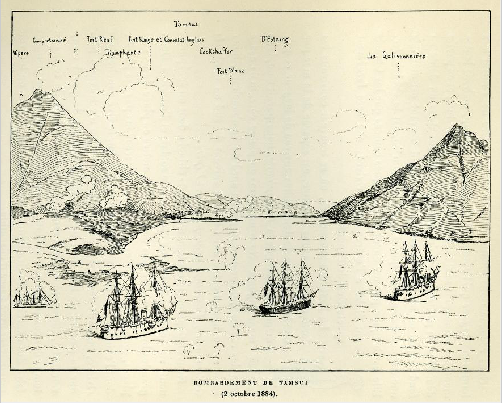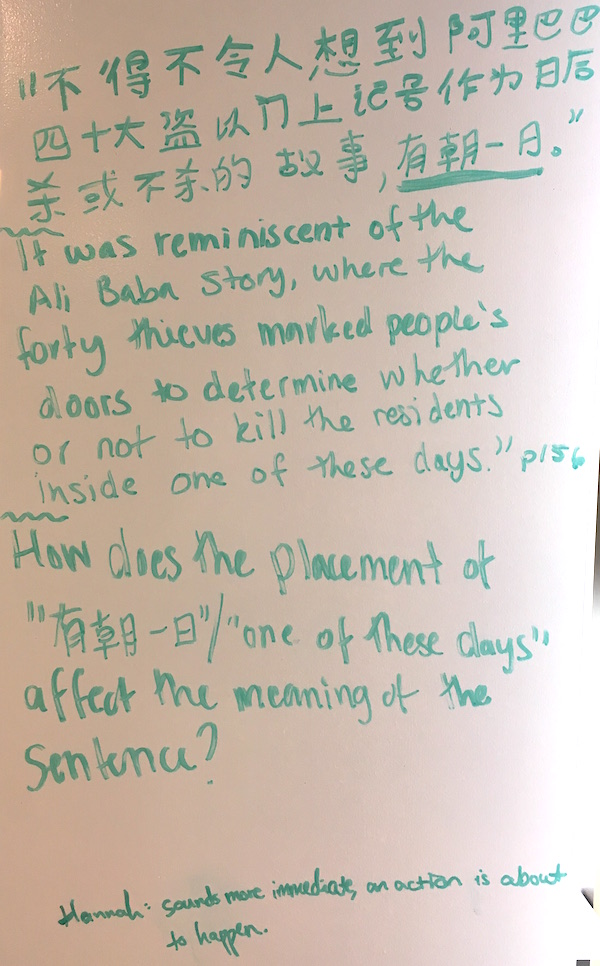
The Trade of Goods and Ideas
A reading route prepared by Claire (FLAC), Jie/Bruce, Anna, Krysta
In this section, we look at how knowledge and ideas are passed down through various items. We also examine the implicit ideas tied to the trade and sharing of goods. These ideas consist of political and personal knowledge that the narrator has both received and given, as symbolized by physical objects.
Image Credit: Bombardement de Tamsui (2 octobre 1884)
Trade of Goods and Political Ideas
“十月三十一日,总督府优先开放给你们这些做邻居的, 忘了是否出于学校的规定,你们大都好开心地排长龙进府,行礼祝寿完可得寿桃一,孙女以的天真无邪,可能要到二十年后国际新闻报道里你看到为金日成衷心祝寿祈福的那些假装不来的人民的笑靥,才恍然并感叹不已。 你真羡慕那些从来不曾去排队领寿桃的 (印象里,班上确有那么几人),从来不会被统治者的爱国教育所感动所激励所洗脑… –她们这些当年不肯领寿桃的,在想什么?”(Simplified p188) “On October 31, the Governor-General’s Office had organized an advance, exclusive opening for its neighbors. You could not recall if it was required by the school, but you all happily lined up to enter the building, where you bowed and passed on auspicious birthday greetings, after which you were each given a steamed bun in the shape of a peach. You had been so innocent, so naive, like genteel granddaughters, and it probably wasn’t until twenty years later that you understood and had to sigh over an international news report of people wishing Kim Il Song a happy birthday, the smiles on their faces so obviously genuine. How you envied those girls who had not lined up for a steamed bun (in your memory, there actually were a few in your class), who were neither moved, motivated nor brainwashed by the patriotic education from those in power… –What had those girls who turned down the peach-shaped steamed buns back then been thinking?” (English p191-2).
[/et_pb_vertical_timeline_item][et_pb_vertical_timeline_item title=”Stop 2″ use_read_more=”off” animation=”off” text_font_select=”default” text_font=”||||” headings_font_select=”default” headings_font=”||||” use_border_color=”off” border_style=”solid”]
“但无论牛眼窗糊不糊掉,大叶桑小叶桑种或不种,川七摘是不摘来吃 。。。这些人家都有一个共同点,漆或不漆的木质大门上都用粉笔写着:联(“联合报”),央(“中央日报”),联央,联国(“中国时报”)或国民(“民生报”),从来不见自(自立,自由),不见台(台时,台日),整条巷子无一例外,不得不令人想到阿里巴巴四十大盗以门上记号作为日后杀或不杀的故事,有朝一日。”(Simplified 164) “It didn’t matter whether or not they cemented the openings in the wall, planted varieties of mulberries, or picked and ate the berries in the yard–all these families had one thing in common: on their wooden gates, painted or unpainted, written in chalk, were the names of newspapers: Lian (United Daily News), Yang (Central Daily News), Lian-Yang, Lian-Guo (China Daily News), or Guo-Min (Minsheng Daily). You would never see Zi (Zili–Independent News or Ziyou–Liberty Times), nor Tai (Taiwan Times, Taiwan Daily). No exceptions, up or down the alley and it was reminiscent of the Ali Baba story, where the forty thieves marked people’s doors to determine whether or not to kill the residents inside one of these days” (English p156)
[/et_pb_vertical_timeline_item][et_pb_vertical_timeline_item title=”Stop 3″ use_read_more=”off” animation=”off” text_font_select=”default” text_font=”||||” headings_font_select=”default” headings_font=”||||” use_border_color=”off” border_style=”solid”]
“也有一整条巷子数十年如一日不变,护城河功能的用来隔离国民党宣传机关中广中视,建国南路一段二一二巷,五九号住着一家狗” (Simplified p163) “There was also an entire lane that hadn’t changed in decades and served as a moat to curb the Nationalist government’s propaganda apparatus, such as the Central Broadcasting Company or Central TV; that was Lane 212, Section 1 of Jianguo South Road, where a family of dogs lived in No. 50.” (English p154)
[/et_pb_vertical_timeline_item] [/et_pb_vertical_timeline]
Stop 1 Analysis
Here, the object that is representing an ideology that is being passed on to others is the peach-shaped steamed buns.
The narrator outlines this as she makes the connection between acceptance of the steamed bun with the political brainwashing of the people- in accepting the steamed bun and happily singing happy birthday, they are actually accepting the control and influence of a foreign power over their lives whether they were aware of this or not.
The steamed buns are a symbol of the seemingly good things the dominating power is offering the people to distract them from what is going on, which the narrator realizes later on in her life.
Stop 2 Analysis
In this quote, the objects in focus are the wall, the berries, and the wooden gates with the names of newspapers. Despite what the people may have been used to doing in their daily lives (an idea represented by the berries in the yard), each family has something in common- the Chinese influence that is permeating Taiwan in the form of the wooden gates. The wooden gates in themselves would represent a kind of uniformity on their own, but when taken into account with the fact that they are all marked with the names of Chinese newspapers further pushes the idea that Chinese influence is finding a way to dominate over native culture even in the home. These newspaper names are also a way of marking the family as a reader of specific newspapers. External province people would more likely be readers of United Daily and China Daily, papers sympathetic to KMT, whereas internal province people would read Independence News and Liberty Times, sympathetic to DPP. Here the narrator uses the story of Alibaba, as a Moses Passover type story, to illustrate how reading these newspapers literally marked the reader’s home to indicate their political stances.
Stop 2 Translation Notes
In the original text, the author uses 牛眼窗 or “ox-eye window”. In this translation, these windows are just described as openings in the wall.

In the original text, the last line is “有朝一日” or “one of these days”. This line comes after describing the story (故事). Normally, 有朝一日would be with 日后. However, in the original text, it comes at the end to emphasize the eventuality of killing them or not. This way of writing is a bit odd in Chinese.The English version translates this as “one of these days”. This is generally correct, but perhaps it is not as serious or as odd as it is in the original version. A better translation might be something like “if not tomorrow, someday”
Stop 3 Analysis
Trade of Goods and Foreign Influence
“头几年,她给你寄过枫叶,辣椒红玫瑰红的美丽枫叶,可是真大,大到必须用十六开的封邮寄,你竟有些失望,因为真的太大了,与你曾随意的幻想非常不同” (Simplified p153) “During the early years, she’d sent you maple leaves, beautiful leaves the color of red peppers or of red roses, and so big she’d mailed them in large manila envelopes, so big, in fact, they actually disappointed you, because they were so different from those you’d created in your imagination.” (English p 140).
[/et_pb_vertical_timeline_item][et_pb_vertical_timeline_item title=”Stop 2″ use_read_more=”off” animation=”off” text_font_select=”default” text_font=”||||” headings_font_select=”default” headings_font=”||||” use_border_color=”off” border_style=”solid”]
” 那时候的背景音乐,若你有个念大学的哥哥或姊姊,你可能多少还在听披头士。要是七O年代的第一年,那么不分时地得听Candida,以及第二年同一个合唱团的敲三下,若是六九年末,你就一定听过Aquarius,电视节目《欢乐宫》里每播三次淮会出现一次的那个黑人会唱团The 5th Dimension。再早一点的话,你一定听过学士合唱团的 Can’t take my eyes off you,错过这首的人,十年之后可以再在《越战猎鹿人》里的那场酒吧戏中听到。 虽然你喜欢的是 Don McLean 的 Vincent 和 American Pie,为此我们只好把时间延后两年—-且让我确定一下资料,Vincent 是七二年五月十三日登上拍行榜,那么,这就是七二年的夏天吧,你充耳不闻舞会里的热场第一名三犬夜的 Joy to the world,自然也不理夏天过后三犬夜会更红的 Black & White,你专心一意地翻查刚买不久的东华英文字典,找寻歌词中的生字意义” (Simplified 134). “Back then, your background music, if you had a brother or sister in college, would likely be the Beatles. If it was the beginning of the 1970s, you’d be playing “Candida” nonstop, then in the next year, it would be “Knock Three Times” by the same group. If it was late 1969, then you’d have listened to “Aquarius.” Every third song played on the TV show Happy Palace would be by the black group The 5th Dimension. If it was a bit earlier than that, you’d have heard “Can’t Take My Eyes off of You” by The Graduates. People who missed it then could have heard it in the bar scene in The Deer Hunter ten years later. Since you were fond of Don McLean’s “Vincent” and “American Pie,” we need to move the time forward two years–let me check my data: “Vincent” made it to the pop charts on May 13, 1972, so this makes it the summer of 1972. You turned a deaf ear to “Joy to the World” by Three Dog Night, the hottest song at dance parties, and, of course, you ignored “Black & White,” an even bigger hit by the same group, which came out after the summer, because you were engrossed in the Donghua English Dictionary you’d just bought to look up the meanings of words in the lyrics.” (English p112)
[/et_pb_vertical_timeline_item][et_pb_vertical_timeline_item title=”Stop 3″ use_read_more=”off” animation=”off” text_font_select=”default” text_font=”||||” headings_font_select=”default” headings_font=”||||” use_border_color=”off” border_style=”solid”]
“车飞过大度路口不人,平畴四野的路口几家大展示场大市招 TOYOTA、SUBARU、Crysler ······很像美国的某些小镇。” (Simplified 197) “The Bus raced past the entrance to Dadu Road without turning; alongside the broad field were enormous signs advertising large showrooms for Toyota, Subaru, and Chrysler, just like small-town America.” (English p 204).
[/et_pb_vertical_timeline_item] [/et_pb_vertical_timeline]
Stop 1 Analysis
Here the narrator is reminiscing on the large maple leaves that A had sent her from America. These leaves are a physical representation of a foreign influence in the narrator’s life. They carry with them the memories of A and a striking disappointment that comes when the reality of the leaves is so different from those she had imagined. The maple leaves that are unfamiliar are contrasted with the white oaks that the narrator knows so well.
Stop 1 Translation Notes
An interesting translation change to note here is the different ways the translations deal with referring to paper sizes. In the original version, the envelope is described as “十六开的封邮寄” which refers to and A4 size envelope. The English version interestingly translates this as a “large manilla envelope”. The translator could have referred to it as and A4 sized envelope but chose to refer to it as a large manilla envelope instead. This choice is likely done to make the reading more accessible to the English reader. While English speakers do refer to paper sizes this way, it is far more common to refer to this envelope as a large manilla envelope. By using the more common termonology, the translator makes it easier for the reader to conjure up the image depicted and therefore more accessible to the reader.
Stop 2 Analysis
In this passage, the narrator describes the influences of foreign music she listened to in college. From the Beatles to Don McLean, the music she listened to in college was the background of her life and hence became the walls supporting and surrounding her memories of that time. This music was a permeating foreign influence on the narrator’s life in a period of time she holds in such vivid memory.
The narrator further describes the impact of English language culture on herself and others when she describes her English dictionary. She purchases this dictionary in order to understand the lyrics of the songs she listens to every day. This purchase suggests the pervasiveness of English language media and culture. The popularity of these songs causes the narrator to buy a dictionary just to understand the songs heard daily. In this instance, Taiwan’s own music and culture are overshadowed by foreign influences.
Stop 2 Translation Notes
The author makes an interesting choice in this quote by only translating some of the titles and group names into Mandarin. This choice could be due to the availability of commonly used mandarin terms for the band (i.e. the Beatles/披头士). This may also represent different marketing choices made by companies when expanding English language media to countries with other languages. Some bands and movies are ubiquitously popular and are therefore given mandarin names by viewers. Some companies may seek to integrate themselves into the Chinese market by giving their works their own mandarin names. On the other hand, some companies may not consider this as being necessary, so they leave their work with only an English name, which puts the translation burden on the non-English speakers.
Stop 3 Analysis
Here the car dealerships represent a physical manifestation of foreign (American and Japanese) influence on Taiwan. Whether it’s the planting of trees or car dealerships there is some carry over of ideology into physical representations. In this instance, the large commercial showrooms for these car dealerships are in direct contrast to the row of green nightshade trees that also lies along Dadu Road. The narrator feels a deep connection to these trees. While on the bus, she hopes to see these trees, because they harbor a deep connection to her teenage years with A. The appearance of a large advertisement representing the trade of cars and American ideals is in direct contrast to the narrator’s desire to revisit her past memories by seeing the nightshade trees. These trees were actually planted by the Japanese, a foreign influence on Taiwan. They are preceded by another, newer American influence.
